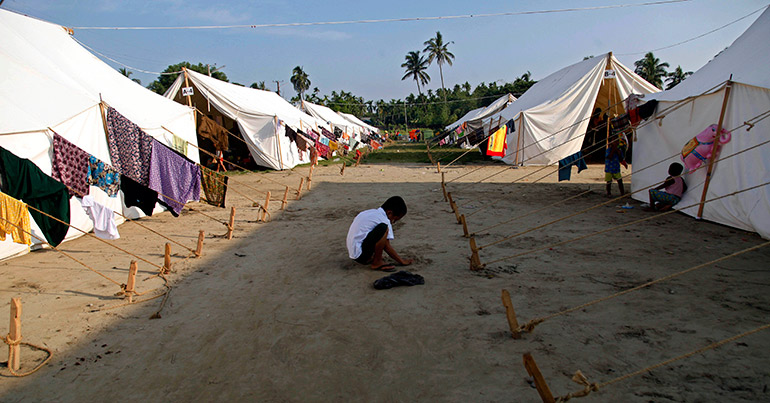A new Muslim insurgency has emerged in the troubled region, and a report today suggests persecuted Rohingya could become radicalised unless Myanmar’s army ends its crackdown

Myanmar military operations targeting Rohingya Muslims in the country’s Rakhine State has spawned an insurgency that has left the region open to becoming an Islamic State (Isis) recruiting ground, according to an International Crisis Group report released today.
The report calls the emergence of Harakah al-Yaqin (HaY), a new, well-trained insurgent group behind deadly attacks on border guard posts that sparked the crackdown in Rakhine State, a “game-changer” in Myanmar’s ongoing internal conflict.
International Crisis Group says “the current violence is qualitatively different from anything in recent decades” and that the HaY insurgents are adequately funded, well-trained and experienced in guerrilla warfare.
Initially, many assumed the October border attacks were carried out by the Rohingya Solidarity Organisation, an armed group formed in 1982 that has served as a convenient government justification for the perpetual persecution of Rohingya Muslims.
But two YouTube videos surfaced on 11 October in which militants of unknown ethnicity claimed responsibility for the attacks. The S. Rajaratnam School of International Studies and the New York Times soon identified the militants as members of HaY.
Through interviews with six members of the insurgent group, International Crisis Group has uncovered further details about its origins, structure and objectives.
The report explains that the main speaker in the YouTube videos is Ata Ullah, a Karachi-born Rohingya Muslim who grew up in Saudi Arabia and has extensive connections in Bangladesh, Pakistan and possibly India.
Ullah is joined by some twenty other Rohingya from Saudi Arabia with similar experience, who run the group in conjunction with a committee of Rohingya émigrés based in Mecca, Saudi Arabia.
According to the report, the outbreak of anti-Muslim violence in Rakhine State in 2012 provided the impetus to establish HaY – referred to by the Myanmar government as Aqa Mul Mujadhidin.
Ullah disappeared from Saudi Arabia shortly after that spate of violence erupted in Rakhine State, with reports suggesting he went to Pakistan to receive practical training in guerrilla warfare before returning to Rakhine in 2013 to begin active recruitment and of local leaders.
Despite links to terrorist rings in Bangladesh, Pakistan, Saudi Arabia and possibly India, the majority of fighters are local Muslim villagers “who have been given basic training and organised into village-level cells to limit risks of compromise”. They are led by young Islamic clerics, known as “Mullahs” or “Maulvis”, or scholars, known as “Hafiz”, from those villages.
Evidence collected by International Crisis Group suggests that while the group has links with international jihadist networks, its aims should not be seen as consonant with these groups.
“All point to this being an insurgent group targeting Myanmar security forces and aiming – albeit in a way likely to be counterproductive – to obtain rights for the Rohingya in Myanmar,” says the report. There is little evidence to suggest that non-Rohingya Muslims have joined the fight.
International Crisis Group warned that the government’s heavy-handed security response – villagers and community leaders have reported the military shooting civilians on sight, as well as multiple cases of arson, looting and rape – “is likely to drive a dangerous spiral of attacks, military responses and increased popular radicalisation”.
“After two rounds of attacks and a brutal security response, it appears that a sizeable proportion of the area’s Muslim population and the diaspora support or are sympathetic to HaY,” the report explains.
While the Rohingya population has traditionally not been associated with Islamic terrorism, the report warns that if the government’s military crackdown continues, it could potentially drive despairing Rohingya Muslims into the hands of international jihadist groups, such as Al-Qaeda and Isis.
“If the government mishandles the situation, however, including by continued use of disproportionate military force that has driven thousands across the border to Bangladesh, it could create conditions for radicalising sections of the Rohingya population that jihadist groups might exploit for their own agendas,” the report warns.
“To avoid that risk requires a moderated military response, well-crafted political strategy and closer cooperation and intelligence sharing with Myanmar’s neighbours and the Asean bloc.”
